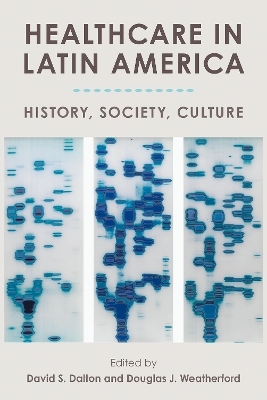
Healthcare in Latin America
History, Society, Culture
Seiten
2022
University Press of Florida (Verlag)
978-1-68340-261-9 (ISBN)
University Press of Florida (Verlag)
978-1-68340-261-9 (ISBN)
Illustrating the diversity of disciplines that intersect within global health studies, Healthcare in Latin America is the first volume to gather research by many of the foremost scholars working on the topic and region in fields such as history, sociology, women’s studies, political science, and cultural studies.
Through this unique eclectic approach, contributors explore the development and representation of public health in countries including Argentina, Bolivia, Brazil, Chile, Colombia, Cuba, Ecuador, El Salvador, Guatemala, Mexico, Nicaragua, Puerto Rico, and the United States. They examine how national governments, whether reactionary or revolutionary, have approached healthcare as a means to political legitimacy and popular support. Several essays contrast modern biomedicine-based treatment with Indigenous healing practices. Other topics include universal health coverage, childbirth, maternal care, forced sterilization, trans and disabled individuals’ access to care, intersexuality, and healthcare disparities, many of which are discussed through depictions in films and literature.
As economic and political conditions have shifted amid modernization efforts, independence movements, migrations, and continued inequities, so have the policies and practices of healthcare also developed and changed. This book offers a rich overview of how the stories of healthcare in Latin America are intertwined with the region’s political, historical, and cultural identities.
Through this unique eclectic approach, contributors explore the development and representation of public health in countries including Argentina, Bolivia, Brazil, Chile, Colombia, Cuba, Ecuador, El Salvador, Guatemala, Mexico, Nicaragua, Puerto Rico, and the United States. They examine how national governments, whether reactionary or revolutionary, have approached healthcare as a means to political legitimacy and popular support. Several essays contrast modern biomedicine-based treatment with Indigenous healing practices. Other topics include universal health coverage, childbirth, maternal care, forced sterilization, trans and disabled individuals’ access to care, intersexuality, and healthcare disparities, many of which are discussed through depictions in films and literature.
As economic and political conditions have shifted amid modernization efforts, independence movements, migrations, and continued inequities, so have the policies and practices of healthcare also developed and changed. This book offers a rich overview of how the stories of healthcare in Latin America are intertwined with the region’s political, historical, and cultural identities.
David S. Dalton, associate professor of Spanish at the University of North Carolina at Charlotte, is the author of Mestizo Modernity: Race, Technology, and the Body in Postrevolutionary Mexico. Douglas J. Weatherford, professor of Hispanic literature and film at Brigham Young University, is the translator of Juan Rulfo’s The Golden Cockerel & Other Writings.
| Erscheinungsdatum | 16.06.2022 |
|---|---|
| Zusatzinfo | 8 b/w illustrations, 8 tables |
| Verlagsort | Florida |
| Sprache | englisch |
| Maße | 152 x 229 mm |
| Gewicht | 246 g |
| Themenwelt | Geisteswissenschaften ► Geschichte ► Allgemeine Geschichte |
| Geisteswissenschaften ► Geschichte ► Regional- / Ländergeschichte | |
| Studium ► Querschnittsbereiche ► Geschichte / Ethik der Medizin | |
| ISBN-10 | 1-68340-261-8 / 1683402618 |
| ISBN-13 | 978-1-68340-261-9 / 9781683402619 |
| Zustand | Neuware |
| Haben Sie eine Frage zum Produkt? |
Mehr entdecken
aus dem Bereich
aus dem Bereich
Die Geschichte eines Weltzentrums der Medizin von 1710 bis zur …
Buch | Softcover (2021)
Lehmanns Media (Verlag)
17,95 €
Krankheitslehren, Irrwege, Behandlungsformen
Buch | Softcover (2024)
C.H.Beck (Verlag)
39,95 €


